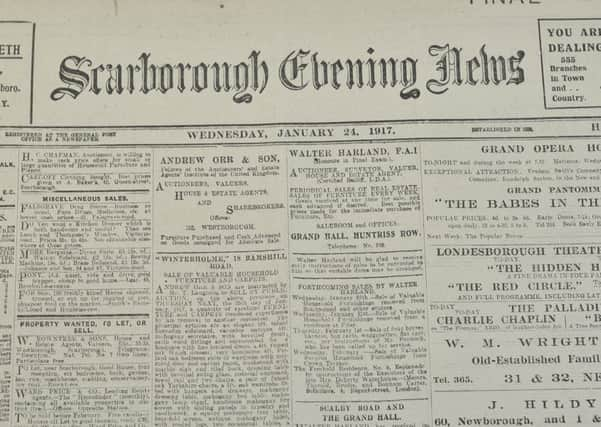1917 crimes: Woman pawned goods entrusted in her care


Prisoner was Ada Mary Wilson, Fells Homestead, West Bedfont, Stanwell, near Staines, Middlesex, and she was charged with having converted to her own use and stolen whilst bailee, certain goods - sheets, blankets and other articles, of the value of £15, belonging to Olive Lavinia Butler, between June 1st, 1916, and December 3rd.
She pleaded guilty, and according to the statement made by the Chief Constable, Mrs Butler, a married woman now residing at Boston, Lincolnshire, from February until June, 1916, she, with her husband, was living at 101 Nelson Street. Prisoner at that time lived next door at 103. In the latter part of June, 1916, Mrs Butler removed to Boston, and at the time she was not in a position to pay the carriage on all her goods. She therefore packed a quantity of articles, the subject of the charge, in four boxes, secured and labelled them all ready to be conveyed to Boston when the time arrived when the carriage could be paid. With the consent of the prisoner the goods were left in her charge. As a matter of fact prisoner owed Mrs Butler a small amount of money, and it was arranged that the prisoner should pay for the carriage on the goods in discharge of this debt when she was able to do so. Nothing occurred until September, 1916, when Mrs Butler wrote to Mrs Wilson and asked her to send the things. Prisoner replied that she had been ill, and out of work, but was starting work the following week, and would send them. They did not arrive. Time went on until October 1917, Mrs Butler could not get her things, and she wrote Mrs Wilson in October last receiving a reply which was admittedly written by the prisoner’s mother, the effect that the goods had been sold for debt. The matter was, therefore, reported to the Boston police, and their advice was that the matter should be reported to the Scarborough police. This was done. A very few articles were found pledged at Messrs I’Anson’s and these had been identified by Mrs Butler on December 3rd. A letter written by prisoner to Mrs Butler stated she was sorry she had not got the goods - she was obliged to part with them with her home, her husband having been discharged out of the Army, and she had no means to send them by rail. She had written, she wrote, to her (Mrs Butler) and got no answer. She had had them a year and five months without any word, and she asked: “What had I to do?” her husband, she added, had had work to seek, and she could not go with him, and could not take the goods with her into lodgings. She was willing to pay for them, if Mrs Butler would let her know how much she required. Great difficulty, said the chief, had been experienced in tracing the goods because of the length of time which had elapsed, and because the prisoner apparently had sold, pledged, and given away the goods indiscriminately to her friends and neighbours. Some goods had been given to a sister, Mrs Palmer, at Sheffield, and other goods had been recovered at York, prisoner having told Detective Yeoman on being brought to Scarborough, and before getting to York, that a woman there (name and address given), had one or two or three articles. The detective called at the address given, and was at once given the articles. Prisoner had given them to her. It appeared from the remaining statement of the chief that the mother and sister and prisoner had been in the habit of pledging goods. When arrested at Staines prisoner said: “Yes, I pledged certain goods at I’Anson’s...” Before reaching York she made the other statement above referred to.
Advertisement
Hide AdAdvertisement
Hide AdBy the clerk: The sum of £15 was the value given for the goods; the market value today would be nothing like that. About half of the goods in value had been recovered, these being plated goods. Some of the other goods she had used and worn out.
Prisoner said Mrs Butler left some of the things with her to wash; and some of the other things were no good at all and were sent to the rag shop.
Asked as to why she covered the goods to her own use, she said she wrote to Mrs Butler and the latter was a long time before she answered. She (prisoner) was unsettled, had nowhere to put the boxes, and did not know what to do with them, That was the reason she parted with them.
The clerk: It has been suggested you were in difficult circumstances, and wanted some money, is that so?
Prisoner: Yes, I wanted money to go down to my husband in Staines, in Middlesex.